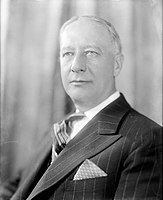1928 United States presidential election
The 1928 United States presidential election was the 36th election in the history of the United States. It happened on November 6, 1928. The election was won by Herbert Hoover. Incumbent President Calvin Coolidge, who had been president since the death of Warren G. Harding in 1923 and was elected to a full term in 1924, decided not to run for re-election.
| |||||||||||||||||||||||||||||
531 members of the Electoral College 266 electoral votes needed to win | |||||||||||||||||||||||||||||
|---|---|---|---|---|---|---|---|---|---|---|---|---|---|---|---|---|---|---|---|---|---|---|---|---|---|---|---|---|---|
| Turnout | 56.9%[1] | ||||||||||||||||||||||||||||
| |||||||||||||||||||||||||||||
ElectoralCollege1928.svg Presidential election results map. Red denotes states won by Hoover/Curtis, blue denotes those won by Smith/Robinson. Numbers indicate the number of electoral votes allotted to each state. | |||||||||||||||||||||||||||||
| |||||||||||||||||||||||||||||
Al Smith, the losing candidate who was a Roman Catholic, was the first Catholic nominee for a major party in American history. He faced widespread anti-Catholic opposition. Hoover was a Protestant since he grew up in a Quaker family. It wasn't until 1960 that a Roman Catholic, John F. Kennedy, was elected.
Charles Curtis was elected vice president, becoming the first Native American and the first person with acknowledged non-European ancestry to reach that office, a feat that was not repeated until 2021, when Kamala Harris became vice president under President Joe Biden
Candidates
changeRepublican Party
change- Herbert Hoover, Secretary of Commerce (nominee)
- Frank Orren Lowden, former Governor of Illinois
- Charles Curtis, Senate Majority Leader from Kansas (vice-presidential nominee)
Democratic Party
change- Al Smith, Governor of New York (nominee)
- Cordell Hull, Representative from Tennessee
- James A. Reed, Senator from Missouri
- Atlee Pomerene, former Senator from Ohio
References
change- ↑ "Voter Turnout in Presidential Elections". The American Presidency Project. UC Santa Barbara.

